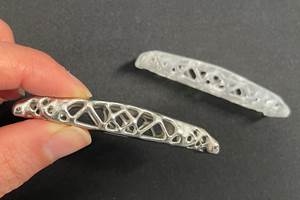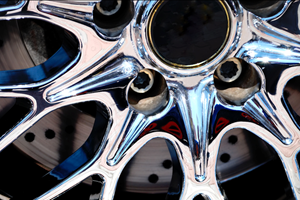Mix of Automation and Skilled Employees Generates Quality
This Pennsylvania plating company’s general manager shares insights about being recognized as a Top Shop for several consecutive years as well as his thoughts about automation, customer service, hiring skilled workers, the challenges of installing a new line and more.

David Wachter, general manager at Great Lakes Metal Finishing, believes it’s the skill and dedication of the company’s employees that make the company a Top Shop. Source (all images): Great Lakes Metal Finishing
Automation is everywhere in the manufacturing workplace nowadays, which means one thing: Manufacturers are getting smarter about how to utilize skilled workers. Manual operations are still necessary in many applications, but where automation makes sense, it benefits humans and their businesses.
Great Lakes Metal Finishing Inc. in Erie, Penn., has been keyed into this notion for a while, considering it automates all nine of its plating lines. Yet, the company’s management clearly values its 42 employees and points to this dedicated staff as the reason the operation has again been named a Products Finishing Top Shop this year.
“I think it is their (employees’) dedication and willingness to meet customer demands, whether it be quick turnaround times or working overtime that makes us a Top Shop,” says David Wachter, general manager. “We have a really good core group of employees who have been here for a long time.” He adds that all the team members show customer loyalty and are focused on producing only quality products.
The zinc plating company serves more than 150 customers throughout the U.S. and Canada. Its customers primarily operate in the military, automotive and general industrial sectors.
From captive shop to complete job shop
At its inception in 1994, with two plating lines — a rack zinc line and a barrel zinc line — Great Lakes Metal Finishing ran a captive shop for a wire goods manufacturer. When the manufacturer was sold and moved to Mexico around 2008, founder and president of Great Lakes, Dennis Hartwig, started exploring new options for the business. Now, the complete job shop operates

The complete job shop operates with all automatic equipment. Although processes still require an operator, there is more time freed up for him to tend to other projects on the shop floor.
with all automatic equipment that consists of four barrel lines and five rack lines, and offers rack and barrel zinc plating and zinc nickel plating, and rack and barrel stainless steel passivation.
Using automatic lines has taught the company about the benefits of automation. “Automatic equipment gives the customer consistent results and good product throughout the entire shift,” Wachter says. By reducing human error and freeing up skilled employees for other tasks on the shop floor, automated processes are not only more accurate but also more efficient.
Military olive drab metal coating, trivalent clear metal coatings, trivalent yellow zinc plating and hexavalent yellow are also among the company’s plating menu. Its dye-free trivalent yellow passivate is ideal for customers that require their products to be ultraviolet stable.
New line overcomes new challenges
While currently in the process of building its fifth barrel plating line, the shop is preparing for growth and responding to customer needs.
Initially, the idea for this new plating line was sparked by potential work that ultimately fell through last year. Therefore, Great Lakes Metal Finishing was forced to rerack and is now installing a different zinc nickel line for its customers in the automotive industry, as well as general fasteners, for extra corrosion protection for their products.

Great Lakes Metal Finishing in Erie, Penn., operates in a 40,000-sq.-ft. building, serving customers across the U.S. and Canada. Its largest customer base is the military, automotive and general industrial sectors.
Although the shop is excited to roll out the new line, Wachter and his team are surprised and disappointed that price increases have been dramatic compared to what prices were last year for a similar project. “Some items have gone up 30 to 40% in just a year,” he says. “We build the lines ourselves, we buy the tanks, the hoists and assemble everything in-house. But costs on everything from the waste treatment to the motors has gone up so much.”
To cushion the blow of the increased expenses, the shop has extended the project time line and is now aiming to have the new line operational for the third quarter of 2025.
A note to the next gen
Even though Great Lakes Metal Finishing has a core band of long-time skilled employees, like any business, it is faced with retiring employees who must be replaced and expanding capabilities that need to be manned. Finding new employees to fill these spots continues to be an obstacle and a frustration.
“For the younger generation, they want everything right now without knowing how to do the job, and it’s difficult to get them to understand that if they put in the time, this can be a very nice, family-sustaining career,” Wachter explains. “We’ve got a few young people who have done that here, where right out of high school they started working for us, and they are willing to put in the work and willing to learn. Now, they are making a very nice wage because they stayed.”
To compete with other jobs that have a higher entry-level wage, however, the company has increased its pay. “In the long term, entry-level employees will be much better off working here rather than a fast-food job,” Wachter adds.
He says some of the shop’s young workers have in fact become dedicated employees who are devoted to customer service, much like the long-time team members.
Along with ensuring quality in its products, customer service is a a top priority at Great Lakes Metal Finishing. The team focuses on quick turnaround on quotes, quick response and strong communication with customers. “That’s one thing that customers have mentioned through the years is that they appreciate our customer service,” Wachter says.
Related Content
Possibilities From Electroplating 3D Printed Plastic Parts
Adding layers of nickel or copper to 3D printed polymer can impart desired properties such as electrical conductivity, EMI shielding, abrasion resistance and improved strength — approaching and even exceeding 3D printed metal, according to RePliForm.
Read MoreSuccessful South African Plater Beating the Odds
Remaining focused on quality and reliability, Team Plating Works stays profitable in a volatile and challenging economy.
Read MoreHow to Maximize Nickel Plating Performance
The advantages of boric acid-free nickel plating include allowing manufacturers who utilize nickel plating to keep up the ever-changing regulatory policies and support sustainability efforts.
Read MoreA Chromium Plating Overview
An overview of decorative and hard chromium electroplating processes.
Read MoreRead Next
Family-owned Zinc Plater Looks to the Future
Creative solutions and a willingness to take on challenges is at the heart of Grand Rapids-based finisher’s success.
Read MorePlating with Zinc-Nickel: Benefits and Challenges
Chad Murphy of Columbia Chemical speaks about the benefits of various types of zinc-nickel alloy, and provides tips for manufacturers about the zinc-nickel plating process.
Read More












.jpg;maxWidth=300;quality=90)









